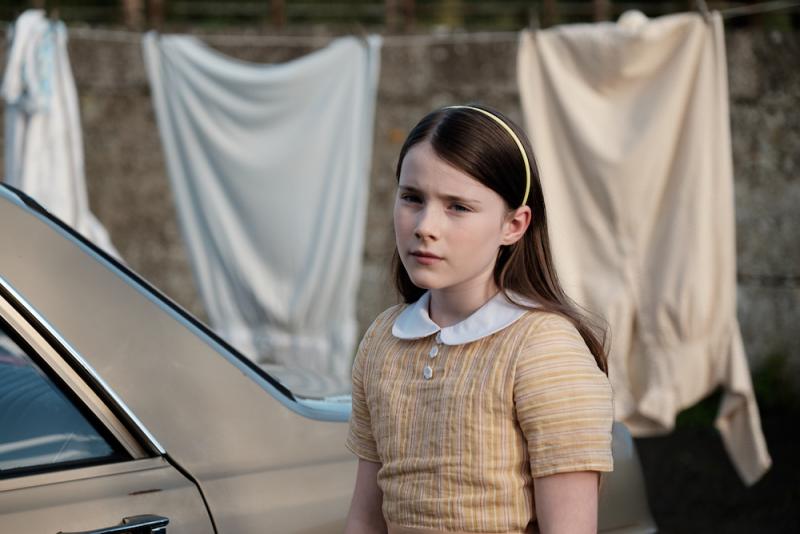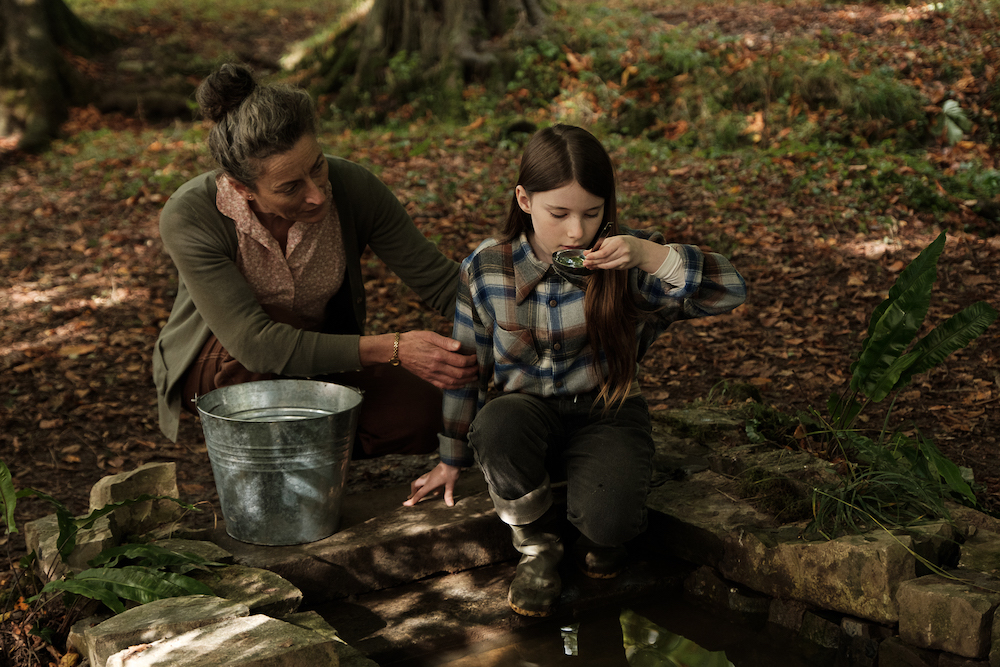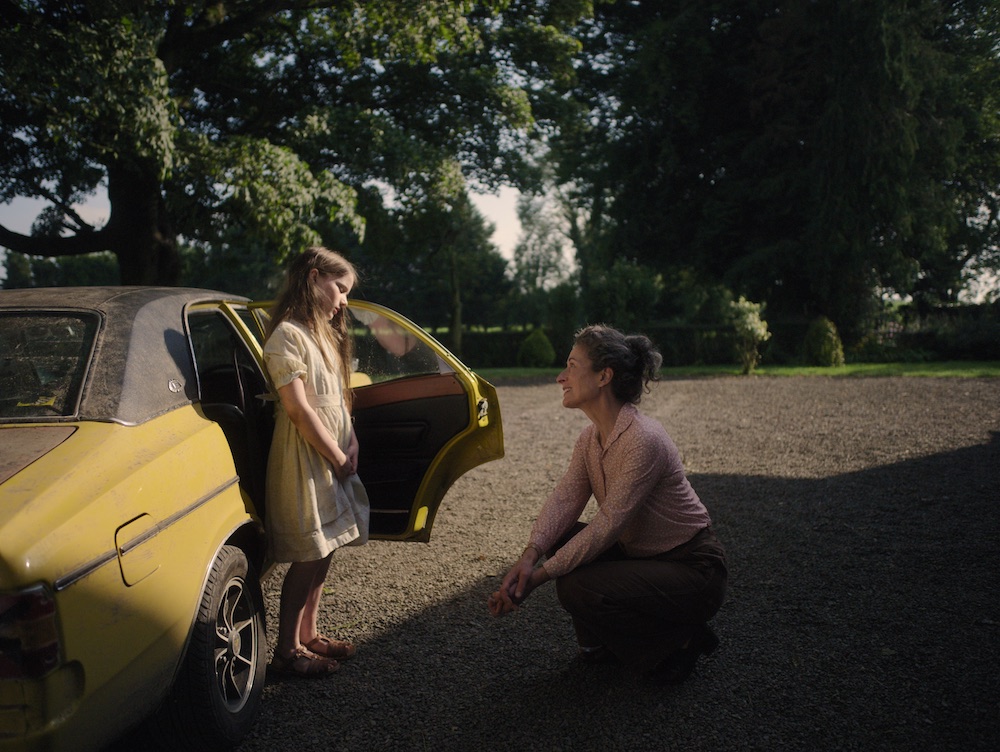The Quiet Girl review - finding a home away from home | reviews, news & interviews
The Quiet Girl review - finding a home away from home
The Quiet Girl review - finding a home away from home
Colm Bairéad's beautiful, understated film is faithfully adapted from Claire Keegan's novella

The Quiet Girl is adapted faithfully from Claire Keegan’s wonderful short story, Foster, first published in the New Yorker magazine in 2010 and then expanded into a novella.
Much of the dialogue in Colm Bairéad’s beautiful, mainly Irish-language film, which is in many ways about the power of silence, is reproduced unchanged from Keegan's book.
Set in 1981, the first scenes present nine-year-old Cáit (the marvellous Catherine Clinch, a 12-year-old newcomer) as more obviously unfortunate than in the book, perhaps to build up back-story.
She’s bullied and slow at school and wets the bed at home, hiding under it in shame. Apparently friendless, she is withdrawn and alone in the midst of her large, impoverished Wexford family, where the feckless, permanently pissed-off dad (Michael Patric) has gambled away the heifer, the harassed mother (Kate Nic Chonaonaigh) is pregnant again, and they can’t afford to pay anyone to get the hay in. The kids' school lunch boxes are empty and the house is grubby, dank and joyless.
Temporary salvation arrives with the summer holidays – it’s an unusually dry summer – when Cáit goes to stay with a cousin of her mother’s, Eibhlín (Carrie Crowley, pictured below), and her husband, Seán (Andrew Bennett), to ease the burden on Cáit’s mother and to give her parents one less mouth to feed. Her father, Dan, drives her there in his bashed-up car, deep into the county towards the coast, mainly without speaking. Cáit looks up from the back seat at the sun-dappled trees. The cinematography by Kate McCullough, with its emphasis on light and shadow, and the score by Stephen Rennicks are exceptional.
 Eibhlín and Seán have a handsome, light-filled house with land and a flourishing dairy farm. Eibhlín is quietly thrilled to see Cáit again, the first time since she was a baby, so the families are clearly not close. These relatives have more money, perhaps a reason for estrangement. Her father stubs his cigarette out on his plate, drops the rhubarb Eibhlín gives him to take home and waits for someone else to pick it up. He drives off without a hug or a kiss, just a brusque, “Try not to fall into the fire, you,” taking her suitcase of clothes with him.
Eibhlín and Seán have a handsome, light-filled house with land and a flourishing dairy farm. Eibhlín is quietly thrilled to see Cáit again, the first time since she was a baby, so the families are clearly not close. These relatives have more money, perhaps a reason for estrangement. Her father stubs his cigarette out on his plate, drops the rhubarb Eibhlín gives him to take home and waits for someone else to pick it up. He drives off without a hug or a kiss, just a brusque, “Try not to fall into the fire, you,” taking her suitcase of clothes with him.
You realise that this is the first time that the girl has had time to think, to be with people who have space for her, who will give her a proper hot bath, brush her hair 100 times, tuck her up in bed and tactfully lay the blame on the mattress for being damp, rather than Cáit, whose agony you feel clearly.
“God help you, if you were mine, I’d never leave you in a house with strangers,” murmurs Eibhlín, sitting on the bed after she thinks Cáit, who has told her that her mother says they can keep her as long as they like, is asleep. Cáit looks at the wallpaper, covered in trains. “There are no secrets in this house,” says Eibhlín later, but still, some things, too painful to confront, aren’t mentioned.
The days pass quietly by, each one like the one before, with Cáit wearing boys’ clothes that are too big for her from a wardrobe in another bedroom. She helps around the house, marvelling at the freezer that stops food growing old, hoovering, peeling potatoes. The bed-wetting stops. “All you needed was some minding,” says Eibhlín. Sometimes people come over for card games and there’s plenty of laughter. But Seán remains taciturn with Cáit.
 One night, after a wake and a terrible revelation, Seán takes her on a magical moonlit walk to the beach. He talks about a colt that almost drowned, and then, after lying motionless on the beach, suddenly got up, revived. “Strange things happen sometimes, don’t they?” he says. “You don’t ever have to say anything. Remember that. Many’s the man lost much because he missed a perfect opportunity to say nothing.”
One night, after a wake and a terrible revelation, Seán takes her on a magical moonlit walk to the beach. He talks about a colt that almost drowned, and then, after lying motionless on the beach, suddenly got up, revived. “Strange things happen sometimes, don’t they?” he says. “You don’t ever have to say anything. Remember that. Many’s the man lost much because he missed a perfect opportunity to say nothing.”
From then on they’re friends, with him timing her running down to the post box, teasing her about being too fast for any man who wants to marry her to catch up with, reading Heidi with her, letting her help sweep the slurry. And when finally, reluctantly, she has to go home, her father, just back from a liquid lunch, misses the perfect opportunity to say nothing.
You’re left with an elegiac yet hopeful feel: a girl has been saved, even though life will be a struggle. As Cáit gives Seán a last hug at the gate, murmuring “Daddy,” as her father stomps down the road towards them threateningly, you know that, with luck, this summer will give her an injection of strength. tt's a moving end to a wonderfully understated, spiritual film.
rating
Explore topics
Share this article
Add comment
The future of Arts Journalism
You can stop theartsdesk.com closing!
We urgently need financing to survive. Our fundraising drive has thus far raised £49,000 but we need to reach £100,000 or we will be forced to close. Please contribute here: https://gofund.me/c3f6033d
And if you can forward this information to anyone who might assist, we’d be grateful.

Subscribe to theartsdesk.com
Thank you for continuing to read our work on theartsdesk.com. For unlimited access to every article in its entirety, including our archive of more than 15,000 pieces, we're asking for £5 per month or £40 per year. We feel it's a very good deal, and hope you do too.
To take a subscription now simply click here.
And if you're looking for that extra gift for a friend or family member, why not treat them to a theartsdesk.com gift subscription?
more Film
 Can I get a Witness? review - time to die before you get old
Ann Marie Fleming directs Sandra Oh in dystopian fantasy that fails to ignite
Can I get a Witness? review - time to die before you get old
Ann Marie Fleming directs Sandra Oh in dystopian fantasy that fails to ignite
 Happyend review - the kids are never alright
In this futuristic blackboard jungle everything is a bit too manicured
Happyend review - the kids are never alright
In this futuristic blackboard jungle everything is a bit too manicured
 Robert Redford (1936-2025)
The star was more admired within the screen trade than by the critics
Robert Redford (1936-2025)
The star was more admired within the screen trade than by the critics
 Blu-ray: The Sons of Great Bear
DEFA's first 'Red Western': a revisionist take on colonial expansion
Blu-ray: The Sons of Great Bear
DEFA's first 'Red Western': a revisionist take on colonial expansion
 Spinal Tap II: The End Continues review - comedy rock band fails to revive past glories
Belated satirical sequel runs out of gas
Spinal Tap II: The End Continues review - comedy rock band fails to revive past glories
Belated satirical sequel runs out of gas
 Downton Abbey: The Grand Finale review - an attemptedly elegiac final chapter haunted by its past
Noel Coward is a welcome visitor to the insular world of the hit series
Downton Abbey: The Grand Finale review - an attemptedly elegiac final chapter haunted by its past
Noel Coward is a welcome visitor to the insular world of the hit series
 Islands review - sunshine noir serves an ace
Sam Riley is the holiday resort tennis pro in over his head
Islands review - sunshine noir serves an ace
Sam Riley is the holiday resort tennis pro in over his head
 theartsdesk Q&A: actor Sam Riley on playing a washed-up loner in the thriller 'Islands'
The actor discusses his love of self-destructive characters and the problem with fame
theartsdesk Q&A: actor Sam Riley on playing a washed-up loner in the thriller 'Islands'
The actor discusses his love of self-destructive characters and the problem with fame
 Honey Don’t! review - film noir in the bright sun
A Coen brother with a blood-simple gumshoe caper
Honey Don’t! review - film noir in the bright sun
A Coen brother with a blood-simple gumshoe caper
 The Courageous review - Ophélia Kolb excels as a single mother on the edge
Jasmin Gordon's directorial debut features strong performances but leaves too much unexplained
The Courageous review - Ophélia Kolb excels as a single mother on the edge
Jasmin Gordon's directorial debut features strong performances but leaves too much unexplained
 Blu-ray: The Graduate
Post #MeToo, can Mike Nichols' second feature still lay claim to Classic Film status?
Blu-ray: The Graduate
Post #MeToo, can Mike Nichols' second feature still lay claim to Classic Film status?

Comments
But there's a further,
Loved this. Can't wait for a
An absolutely beautiful film.
An absolutely beautiful film. I saw it first in March 2023 and then three times more after that at local cinemas. The story, the characters, the setting, the visuals, the performances, the musical score, are all first rate and imprint themselves indelibly on your mind and imagination. I've seen other films in recent months and only "Past Lives" comes remotely close to the effect "The Quiet Girl" has had upon me. I'm a retired child protection worker and Cait's story brought back many bittersweet memories of the kids and parents I used to work with. Even just writing these few lines I find myself overwhelmed by remembered images and scenes from the film. A small film with a big heart.